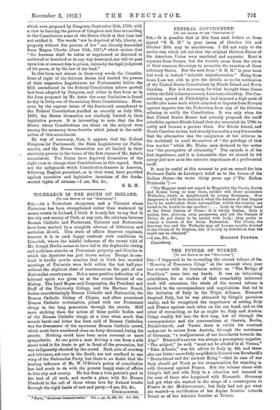FEDERAL GOVERNMENT.
(To THE EDITOR OP THE "EnsmAros,.”.1
Srn,—It is possible that at this time such letters as those signed "S. R. H." in your issues of October 5th and October 26th may be mischievous. I did not reply to the earlier one, which set out that the original thirteen States of the American Union were unrelated and separate. Kent is separate from Sussex, but the trouble arose from the claim of their common Sovereign to prescribe the taxation of these tributary States. But the note from " S. R. H." in your issue last week is indeed " valuable misinformation." Being from home I am not able to give the details as to the ratification of the United States Constitution by Rhode Island and North Carolina. Nor is it necessary, for what brought these States within the fold is known to every American schoolboy. The Con- stitution agreed at Philadelphia had imposed a high scale of tariffs (the same scale which attached to imports from Europe) against imports into the Federation from any of the thirteen refusing to ratify the Constitution. It was only when the first United States Senate had actually prepared the tariff schedules against Rhode Island that she consented (in 1790) to ratify and became a partner State. For Rhode Island, and North Carolina no less, had already learned in a very few months that the alternative was the emigration of her citizens to the mainland, to avail themselves of " the privilege of that free market" which Mr. Blaine once declared to the writer was " the prerogative of citizenship." The episode is of the first importance, and it is lamentable that we should be led astray just now as to the cohesive importance of a preferential tariff.
It may be useful at this moment to put on record the late Professor Emile de Laveleye's belief as to the future of the Balkan States—he wrote thirty years ago (" The Balkan Peninsula ")
:- "The Magyars must not expect to Magyarize the Croats, Sends and Bosnia being so near them, neither will these assimilate Wallachia, which is neighboured by young Roumania. How dangerous it will be to Austria if when the defence of that Empire has to be undertaken these nationalities within the country are found to be hostile to one another ! . . . Look on the other hand at the Swiss Canton of Ticino : it is wholly Italian. Italy is united, free, glorious, even prosperous, and yet the Italians of Ticino do not desire to be united with Italy : they prefer to remain a Canton of the Swiss Federation. The Croats, the Servians too, and the Wallachs may all becomo equally devoted to the Crown of St. Stephen, but it is only by federation that the result can be obtained."


























































 Previous page
Previous page